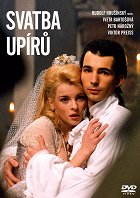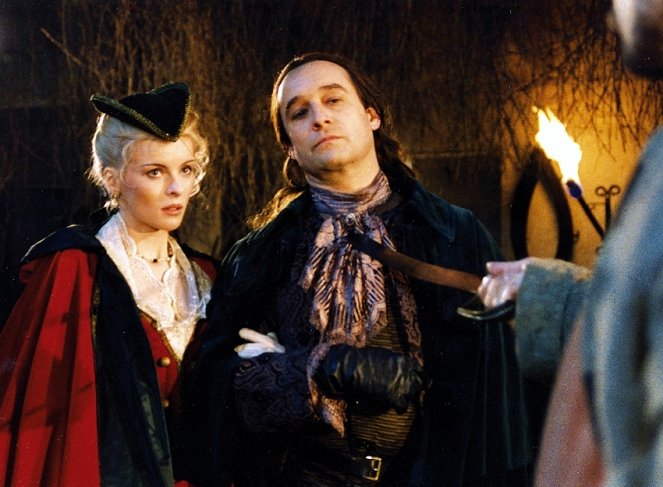Regie:
Jaroslav SoukupKamera:
Vladimír SmutnýMusik:
Zdeněk BartákBesetzung:
Rudolf Hrušínský nejml., Iveta Bartošová, Miroslav Táborský, Petr Nárožný, Vladimír Marek, Otakar Brousek ml., Viktor Preiss, Oldřich Vízner (mehr)Inhalte(1)
In this romantic horror comedy Jaroslav Soukup sought to fuse popular TV and music personalities INTO a family costume comedy. A young Englishman comes to rococo Prague to see his lady love, and gradually discovers that her family, and perhaps even she herself, are the cre`me de la cre`me of vampire society. (Verleiher-Text)
Kritiken (4)
Ein sehr guter Film – überraschend gut. Und ich habe ihn so lange ignoriert… Dabei handelt es sich um eine Horrorkomödie mit allem Drum und Dran, die witzig ist, wenn sie witzig sein soll. Und wenn sie möchte, erschreckt sie das Publikum. Beim Blick auf Viktor Preiss und seinen untoten Adel muss sich jeder Vampir-Liebhaber freuen. Das Trio Petr Nárožný - Luděk Kopřiva - Petr Pelzer reitet auf Särgen und führt etwas Unbeschreibliches vor. Und Rudolf Hrušínský ist schließlich nicht ganz unnütz. Die einzige uninteressante Figur spielt auf eine völlig uninteressante Art und Weise Iveta Bartošová, aber damit kann man leider nichts machen. Und noch etwas. Jemand von euch saugt das Blut von meinem Kapellmeister! Ich habe ihn für viel Geld aus Salzburg eingeladen. Er wollte noch so viel schreiben und jetzt komponiert er ein Requiem für sich selbst!
()
A film about the love between a human and a vampire, and which celebrates chastity and passivity. Yeah, who would have thought that the Twilight franchise would have a precedent in the form of a fifteen-year-old Czech film directed by the guy whose contributions to Czech culture include Kamarád do deště, Discostory and the Major Meisner movies? The Vampire Wedding is a typical example of one strand of post-totalitarian cinema in the first half of the 1990s. Whereas under communism it was entirely common that Czech pop culture (especially music) piggy-backed on western titles, this plagiaristic tendency resulting from limited domestic distribution and censorship suddenly changed after the revolution, as filmmakers gained the ambition to make Czech contributions to foreign genres. In line with the mood at the time, filmmakers did not limit themselves to making mere copies, but instead came up with ostentatiously “Czech” variations on western formulas in an effort to be worldly and to demonstrate the uniqueness of the Czech film environment. Because there was no real tradition of horror in the Czech environment, at least not in Czech cinema, Soukup and co. proceeded based on Polanski’s The Fearless Vampire Killers, which was probably the first Slavic mark made on the Hollywood genre. As a proudly Czech project, The Vampire Wedding ostentatiously diverges from the vampire canon (garlic has no effect on Czech vampires and crucifixes aren’t much good either) and, in line with the rhetoric of the day, the advantages of the Czech environment are highlighted with the vehemence of a tour guide. Prague is thus presented as a city of alchemists and golems, though beer still remains its greatest virtue. At the same time, The Vampire Wedding is part of the period trend of transforming the image of communist-era stars for the new age. The film was thus evidently supposed to be a vehicle for television celebrity and singer Iveta Bartošová to break into the world of film as a portrayer of romantic roles, while the film was also intended to erase Rudolf Hrušínský’s image as a foppish teenager and enhance his status as a poster-boy idol for girls with the role of a charming and sensitive romantic hero. Nevertheless, the change didn’t take hold for either of them, making this film an even more bizarre phenomenon in their respective careers.
()
Yes, I know this isn't great art; some jokes are quite cheap, Hrušínský doesn't hold a candle to his grandfather, Iveta Bartošová has about as much to do with acting as I do with being a cardinal in the Roman Catholic Church, and the plot is blatantly stolen from Polanski. Nevertheless, I like this film and believe it has a decent entertainment potential. Petr Nárožný and especially Viktor Preiss, who is rarely cast in films, relish their roles, and Luděk Kopřiva is much more acceptable to me in this film than in Troška's rural comedies. Overall impression: 60%.
()
This is by far the best film of the Soukup/Hrušínský III/Bartošová trio. To this day, I'm still not quite sure how this bunch managed to make a tastefully ironic variation on classic gothic vampire horror films and add something extra to it. Prague in the 18th century is captured perfectly, the costumes and sets are top-notch, and the story has its own charm. The youth is complemented by excellent actors of the older generation - the sexy aristocrat Viktor Preiss, the love-tortured Oldřich Vízner, and the bon vivant Petr Nárožný.
()

